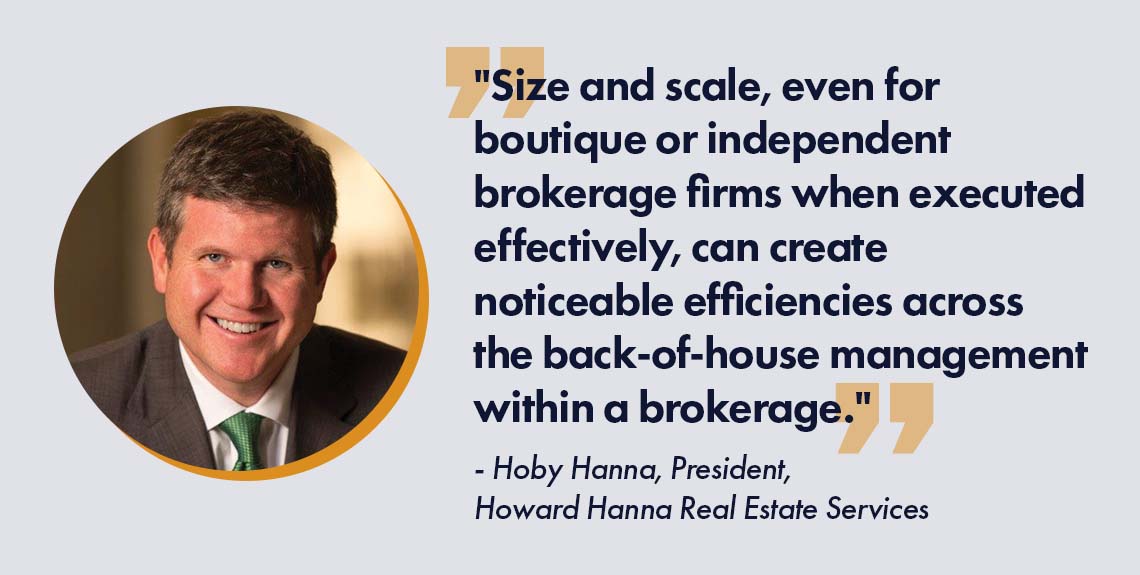Phil McBride, company operating officer at John L. Scott Real Estate, notes that mergers and acquisitions, when done correctly, can increase the breadth and depth of a brokerage’s impact as they grow and expand their company footprint.
“This trend heightens further during the more challenging times in the real estate industry,” he says. “Many real estate companies pursued mergers and acquisitions through market adjustments like we saw in 2018 and during the 2008 housing market crash. During these times, brokerages with stable footing often see mergers and acquisitions as a critical piece of their growth and continued success.”
During the recent market expansion fueled by low interest rates, the industry saw new firms open to take advantage of the historic market. When faced with the more challenging market today, some of these firms find themselves unprepared, ultimately seeking an exit strategy.
At the same time, some brokerages that have been through a market cycle or two are unwilling or unable to make the changes it takes to lead their company through tough times. The leadership of these offices may be concerned about the ability to weather a storm—or may simply not want to due to a variety of factors.

“A merger or acquisition could be a good way to ensure the success of their office with the financial and leadership backing of an established real estate brand in the area,” McBride says. “Whatever the reason the seller seeks an exit strategy, they all want to find a solution that is best for the agents in their company.”
Howard “Hoby” Hanna, president of Howard Hanna Real Estate Services, believes that current consolidation is creating efficiencies and accelerating growth across the industry.
“First and foremost, I believe that size and scale, even for boutique or independent brokerage firms when executed effectively, can create noticeable efficiencies across the back-of-house management within a brokerage,” he says. “Upon consolidation, we often realize efficiencies in operations, cost-effective communal marketing and technology expenses, and superior support for agents—ultimately increasing brokerage margins.”
Hanna also believes that there has been a historic lack of leadership and succession planning throughout the real estate industry, making it ripe for consolidation.
Ryan Raveis, co-president of William Raveis Real Estate is coming off two successful acquisitions over the last year—acquiring Key Solutions in Sarasota, Florida, and Fenton & Lang in Jupiter Island, Florida.
Raveis believes that we may be seeing some things slow down in regard to M&A in the short term compared to what the industry has experienced since 2020.
“The past two years, we’ve had a tremendous influx of capital into the industry through new firms that went public or raised money through debt with low interest rates, or raised money through other partners,” he says. “I think that will look different moving forward.”
George Slusser, a partner with Long Beach, California-based WAV Group, notes that M&A has always been about creating economies of scale for the buyer, and there are only two ways to grow a real estate company: recruiting and increasing the per-person productivity of existing agents.
“M&A is just recruiting a group, and much of the same recruiting techniques are used,” says Slusser. “The last few years have been maybe the best time in history to buy and sell. The market is changing, however. In the last three months, we have seen our buy-side clients shifting to only an interest in consolidation opportunities, which we call fold-in or roll-in. This is where one office closes and combines with another. This maximizes the potential for a profitable M&A.”

Mike Golden, co-CEO of @properties Christie’s International Real Estate, notes that it is increasingly difficult in this competitive environment for smaller brokerages to find value and efficiency without going under a larger umbrella.
“Larger brokerages are coming in and acquiring the firms that might not have the bandwidth to provide the technology, coaching, training and marketing support that the larger firms can, which is increasingly critical for agent retention and success,” he says. “However, depending on the acquirer, those smaller companies may be losing the local leadership and personal touch that led to their success in the first place.”
For that reason, Golden views partnering with local, independent owners to provide big-company resources while they maintain the boutique culture and agility as a winning opportunity.
Thad Wong, co-CEO and co-founder of @properties Christie’s International Real Estate, notes that those who were looking to sell in 2021 were savvy enough to know that it was an anomaly year and that the market would correct; those companies on the market now, therefore, may have mistimed the opportunity.
“Now, people are looking at things a little differently from both the buyer and seller side,” Wong says. “If something was on the market in early 2021, they allowed themselves a much better likelihood to have probability and earn-out than those that waited.”



